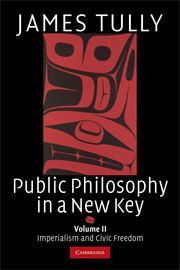Book contents
- Frontmatter
- Contents
- Acknowledgments
- Credits
- INTRODUCTION
- PART 1 GLOBAL GOVERNANCE AND PRACTICES OF FREEDOM
- 1 The Kantian idea of Europe: critical and cosmopolitan perspectives
- 2 Democracy and globalisation: a defeasible sketch
- 3 An ecological ethics for the present
- 4 The unfreedom of the moderns in comparison to their ideals of constitutional democracy
- PART 2 ON IMPERIALISM
- CONCLUSION: CIVIC FREEDOM CONTRA IMPERIALISM
- Bibliography
- Index to Volume II
2 - Democracy and globalisation: a defeasible sketch
Published online by Cambridge University Press: 05 September 2012
- Frontmatter
- Contents
- Acknowledgments
- Credits
- INTRODUCTION
- PART 1 GLOBAL GOVERNANCE AND PRACTICES OF FREEDOM
- 1 The Kantian idea of Europe: critical and cosmopolitan perspectives
- 2 Democracy and globalisation: a defeasible sketch
- 3 An ecological ethics for the present
- 4 The unfreedom of the moderns in comparison to their ideals of constitutional democracy
- PART 2 ON IMPERIALISM
- CONCLUSION: CIVIC FREEDOM CONTRA IMPERIALISM
- Bibliography
- Index to Volume II
Summary
INTRODUCTION: A POLITICAL PHILOSOPHY OF THE PRESENT
In this chapter I extend my investigation of the anti-imperial critical ethos in Chapter 1 by introducing two ways of studying globalisation and democratisation. The first is by means of ‘restrictive’ practices of governance and practices of democratic freedom (or democratisation). I argue that the global governance and cosmopolitan democracy approaches to globalisation are examples of this restrictive way (often referred to as ‘globalisation from above’). The second is by means of ‘extensive’ practices of governance and democratic freedom. This way is particularly effective in throwing light on globalisation and democratisation ‘from below’ and its possibilities for deeper democratisation. The chapter draws on my development of this practice-based approach to government and freedom in Volume I, Chapters 1–3 and begins the application of it to globalisation in the following chapters. I open by situating my particular public philosophy approach in the critical tradition from which it derives.
When philosophy paints its grey in grey, then has a shape of life grown old. By philosophy's grey in grey it cannot be rejuvenated but only understood. The owl of Minerva spreads its wings only with the falling of dusk.
Recall that in this famous conclusion to the Preface of the Philosophy of Right, Hegel advances two closely related claims about the relation between political philosophy and political practice. Only when an organised form of political life has come to maturity and grown old can it be given adequate expression by means of philosophical reflection.
- Type
- Chapter
- Information
- Public Philosophy in a New Key , pp. 43 - 72Publisher: Cambridge University PressPrint publication year: 2008



